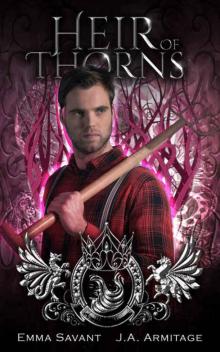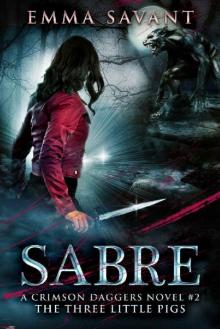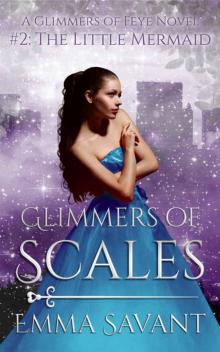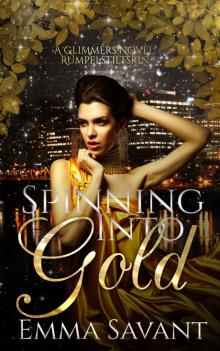- Home
- Emma Savant
Spinning Into Gold
Spinning Into Gold Read online
Spinning Into Gold
A Glimmers Novel: Rumpelstiltskin
Emma Savant
Copyright © 2017 Emma Savant
All rights reserved.
Cover design by Emma Savant.
Editing by Elayne Morgan, www.serenityeditingservices.com
All rights reserved. This book or any portion thereof may not be reproduced or used in any manner whatsoever without the express written permission of the publisher except for the use of brief quotations in a book review.
This is a work of fiction. Names, characters, businesses, places, events and incidents are either the products of the author’s imagination or used in a fictitious manner. Any resemblance to actual persons, living or dead, or actual events is purely coincidental.
ISBN-13: 978-0-9981500-6-2
www.EmmaSavant.com
Contents
Chapter 1
Chapter 2
Chapter 3
Chapter 4
Chapter 5
Chapter 6
Chapter 7
Chapter 8
Chapter 9
Chapter 10
Chapter 11
Chapter 12
Chapter 13
Chapter 14
Chapter 15
Chapter 16
Chapter 17
Chapter 18
Chapter 19
Chapter 20
Chapter 21
Chapter 22
Chapter 23
Chapter 24
Chapter 25
Chapter 26
Chapter 27
Chapter 28
Chapter 29
Chapter 30
Chapter 31
Chapter 32
Chapter 33
A Note from Emma
Also by Emma Savant
About the Author
Chapter 1
The rhythm of the drums pulsed behind me, alternating with high-pitched piano chords and the deep thrumming of a bass. The song forced its way up and out of me like something alive, and I held onto the microphone for dear life as I belted out the final note. It arced and vibrated in the air.
In front of me, blinding pink spotlights filled my vision. They were hot, kissing my skin where it emerged from the tank top and tiny shorts that let me move freely while I sang. The world didn’t exist past the edge of this stage.
This world was tiny, and I owned it.
Then the song was over, the lights flashed in front of me, and I was met with an insipid noise that could barely pass for applause.
It doesn’t matter, I reminded myself. Ten or ten thousand, give them your best show.
Dad had said those words a thousand times. They were as much a part of me as the music and the dancing. The size of the crowd didn’t matter. I couldn’t control that. All I could control was whether I gave them everything I had.
I jumped up and down and waved, trying to share my energy with the crowd. I could feel them out there, shifting and waiting, some of them happier because of my music but most of them impatient, just waiting for the main act.
“Good night, everybody!” I shouted into the mic, and the applause was back, warmer, because they knew Cassidy Tremaine would be next up as soon as I cleared the state fair stage.
I ran off and out of the limelight, my breathing heavy from the exertion of spending twenty minutes giving my all to people who considered me the soundtrack to a waiting room.
Dad was in the wings, arms outstretched. I hugged him and let him hug me, and we both pretended it had been a huge success.
“Just imagine if you’d been able to use a glamour on them!” Dad said.
I high-fived him, like this wasn’t just an empty wish we both shared. I could use glamours when I performed for Glimmering audiences. They never seemed to help. My voice didn’t need them, and my image—well, our budget could only do so much in the wardrobe department.
Anyway, the music was what mattered. Surely someone would see that.
Someday.
“Great set, kid,” Dad said. “‘Just Another Runaway’ had some real attitude tonight.”
“Hard to avoid,” I said. I tousled my sweaty hair and let the night air cool me.
Beyond Dad, in the shadowy wings, tech guys stood around and a stylist hovered around Cassidy, fluffing her hair and adjusting her off-the-shoulder sleeves. She shook the stylist off and marched onto the stage to the screams of her hundreds of adoring fans.
I remembered what it was like to have that kind of chaos greet my appearance. I’d had that kind of rabid fandom, once—for about fifteen seconds, when I was seventeen, from a very small subset of the Glimmering world.
It hadn’t been much, and Dad and I hadn’t been savvy enough to fan the blink-and-it’s-gone spark of enthusiasm into a career.
We’d been trying to get the world’s attention back ever since. I was twenty-one now, and it felt like time had already run out.
“Post-show crash is gonna hit,” I said, because that sounded more glamorous than admitting life was starting to wear me down. “Let’s get out of here.”
Back in the tiny dressing room, I peeled off my outfit and wiped the first dozen layers of stage makeup from my face. My mascara was strong enough to withstand a nuclear holocaust, so I left that alone and changed into jeans, a T-shirt, and a Cassidy hoodie.
“I’m not getting paid much for this gig,” I’d told my friend Briana. “But hey, free merch!” I’d given her a matching hoodie and she was so excited I’d been reminded why I’d kept talking to her after high school.
This life didn’t lend itself to lots of lasting friendships. I’d missed so much of high school for my music that I’d barely squeaked through with a diploma. But Briana and Sadie had always been there for me, even when our friendship was down to a text here and there between stops on this tour. They’d be happier if I quit and could actually make it to their birthday parties and girls’ nights out, of course.
Maybe they were going to get lucky soon. I’d noticed my eyes starting to catch on “Help Wanted” signs.
I zipped up the hoodie and slung my colorful slouch bag over my shoulder before heading out of the mostly-empty dressing room. Dad was waiting in the spartan hallway outside, standing under the flickering fluorescent lights and playing a game on his phone.
“Sure you don’t want to hang around and sign autographs after the show?” he said.
His voice was hopeful, but not enough to fool me. No one would be waiting by the tour bus, dying for a selfie with me.
We were only in Texas for another day. Tonight was the last performance of the State Fair’s Grandstand Concert Series, headlining pop sensation Cassidy Tremaine with special guests Dior Miller and Liquid Blitz. The musicians of Liquid Blitz were my band for this tour, and Liquid’s lead singer, Vayu, took over for their numbers that covered Cassidy’s costume changes.
Dad’s optimistic comments aside, no one would notice if I disappeared.
“Maybe next time,” I said. “I think you said something about milkshakes.”
I propped my feet up on the booth across from me. Dad did the same on the other side, and I could see his big sneakers, too young for him, nudging my purse as he fidgeted. A waitress came by and set our milkshakes on the table, then disappeared back into the kitchen.
I was sad to see her go. She looked exactly like the kind of woman you’d expect to see working this place: older, with red hair that wasn’t quite her shade, and a demeanor that said she knew how to keep a room full of hungry patrons in line. Maybe she’d be able to keep my feelings in line, too. It was getting hard to keep smiling.
The diner was almost empty this late in the evening, but it felt like the kind of place where groups of old guys had been coming ever
y morning for decades to get away from their wives and pass the time. The best diners were all the same: a lingering smell of coffee, a thin film of grease on the countertops, faded brown carpet that had once been an actual color, and milkshakes that made my mouth freak out a little at the realization anything so good existed in this world. I couldn’t drink dairy when I’d be singing, but I had the day off tomorrow while we drove to New Mexico, and that would give me plenty of time to hydrate and gargle tea.
“We’ve got to get you back in with some Glim artists,” Dad said in a low voice.
He was never cautious enough. I snuck a finger down the neckline of my hoodie and touched my thin, collapsible silver wand. Its handle stuck out from an inside pocket I’d hurriedly charmed into the fabric, and the metal against my fingertip was just enough to let me access the stream of magic that flowed constantly through it. A moment later, a barely-there bubble shimmered around us and disappeared.
Dad didn’t even notice.
“I was thinking, all we’d need to do is spin this gig into another gig just like it, but with a Glimmering musician. You’re good enough to succeed in either world, but you know and I know you’ll shine brighter when you don’t have to scale your energy back for the audience.”
“Forget shining brighter,” I said. “It’s just more fun being able to throw energy back and forth.”
“For you and your fans,” he said.
I sipped my milkshake instead of reminding him that I only had a couple dozen of those left.
“I think you need a social media manager, too,” he said. “It would mean you wouldn’t have to worry about updating your JinxNet profiles so often, and someone who’s really good could get some online buzz going. What do you think?”
“I like managing my social,” I said. “I like connecting with people.”
“But don’t you think a professional might be able to do more?”
He seemed to pick up on my disappointment at the idea, because he shrugged and changed the subject. I continued sipping, half listening to him and half marveling at the wonder that was chocolate mixed with freezing cold cream.
None of his ideas were actually going to go anywhere. We’d tried so many of them already, but the fact was, Dad wasn’t cut out to be an agent and I wasn’t cut out to be famous. If the world wanted me, it would have had me already.
It had nothing to do with talent. Everyone agreed I was good. But there were a lot of good artists out there, struggling for attention. Fame was lightning, and Dad and I hadn’t figured out how to catch it.
“Maybe we should just go home and focus on putting out the music,” I said when he paused for air. “I can write songs from there just as well, and maybe if I write more songs, one of them will connect with people. It can’t hurt to try.”
“You’ve got to keep performing, though,” Dad said. “You’re electric, Dior. People can’t help falling in love with you.”
“They can, though,” I said. “They were just waiting for Cassidy. I’m not what they paid for. Maybe if I can focus on making new stuff for a while, I’ll find the people who’d be interested in it.”
“You’re magnificent, kid,” he said. “We’ve just got to give it a few more shows. Someone’s going to notice you soon.”
I allocated a tiny bit more brainpower to savoring the milkshake. Dad and I had this conversation at least once a week. Nothing ever changed.
Maybe that was okay.
I could almost believe that, in the moments where I forgot the sheer joy of being onstage and feeling music rise from my body and into the air above the heads of hundreds of people.
Almost.
The waitress stacked some glasses behind the counter. Through a tiny window behind her, I could see the only cook in the place, a bored-looking guy in his forties who had a scruffy five o’ clock shadow and dark eyebrows. He said something to the waitress through the window that I didn’t catch, and she said something back and rolled her eyes.
The bell on the door tinkled. I’d expected us to be the last people to come in tonight, and the guy who entered didn’t look like he belonged in a place like this. His charcoal suit was too well made; his teeth were too bleached; his coffee-black hair was too thick and too shiny. He looked like he’d come from the richest parts of LA or New York, and his tan suggested a glittering million-dollar beach was the only other place he could possibly belong.
He made eye contact with the waitress, and for a second, I was convinced he was there to serve her a subpoena. A career in law might make that suit make sense, although even that would throw me for a loop, because he looked like the kind of guy who exclusively handled the divorce cases of the rich and famous.
Then he looked over at Dad and me, without even scanning the room.
His dark eyes met mine, and a shiver of recognition went down my spine.
Glim.
“You want to sit here at the bar or are you getting something to go?” the waitress asked.
“I’m joining some friends,” he said.
There was no need to ask which friends. She nodded at him, grabbed a menu, and followed him over to our table.
Dad sat up straight. I did, too.
“Dior Miller, I think,” the man said.
Instantly, Dad scooted over on his bench, making room. The man slid smoothly in next to him. The waitress offered him the menu, but he flashed his gleaming teeth at her and said, “Just coffee, please.”
“This late at night?” Dad said, instantly warm, the way he always was with people. “You’re a braver man than I.”
The man smiled at him, but his attention was on me.
“Good show tonight.”
I wrapped my hands around the cold milkshake glass, glad to have something to fidget with.
“Thanks,” I said. “You a Cassidy fan?”
“Now and then,” he said. “I didn’t expect to see a faerie on her stage.”
The air between us cleared. In an instant, we all knew who for sure we were and which world we belonged to, and, as always, the acknowledgement came with a sense of connection and freedom.
“I take what gigs I can,” I said.
“August Rumpel,” he said. He held out a hand. I shook it, and warmth flowed between us. “Pleasure to come across you like this.”
“Dior Miller,” I said. “But you knew that. This is my dad, Neil Miller.”
“Mr. Miller, it’s an honor,” he said, offering Dad his hand, too.
This was a man who knew how to meet strangers. His face held none of the often-awkward excitement I’d come to expect from fans, and his posture didn’t carry the bravado of someone trying to get me to slip me a song they’d written or ask for a donation to their cause. He thanked the waitress graciously when she brought his coffee over, then turned back to me, his attention relaxed and pleasant.
“I’m a talent manager,” he said. “I’m looking for new clients and I like what I saw out there.”
Dad’s fingers twitched on the edge of the table. Our eyes met for a second.
“I’m wondering if you’re looking for representation,” he said. “I understand you’ve been handling your daughter’s career, Mr. Miller.”
“Neil,” Dad said. “Dior and I manage things together.”
“Of course,” he said. “You’ve clearly done a good job, if she’s caught the eye of someone like Cassidy. I’ve worked with Cass, and she’s picky.”
The but hung in the air, unspoken but loud.
“If you ever decide you’d like to hand over some of the busywork and let the talent focus on her extensive talents,” he said, flashing his smile at me, “then mirror me.”
He pulled two cards out of an inner pocket on his suit, handed one to Dad, and slid one across the table to me. The glossy black surface was printed in gold with the words August Rumpel - Rumpel Talent Management - Spun Gold Enterprises and a link to his website. On the back, the card flashed subtly between yellow and rose gold, and various testimonials from past clients fa
ded in and out in a thin, sophisticated black font.
I recognized more than a few of the names. I stared at the card as one gushing testimonial faded slowly in and out. August did more than manage my career. He managed me as an artist. I wouldn’t be who I am today without his help. -Gabriella Dobashi
This guy had repped Gabriella?
She was the hottest thing on the Glimmering music scene right now. She was pure, untouchable glamour wrapped around a set of pipes that could make me cry within two notes, and the man who’d managed her wanted me to mirror him?
All my limited acting training came flooding back as I tried desperately to look like I wasn’t about to scream with excitement.
How had I never heard of this guy?
I probably had, I reasoned. I’d just filtered out his name, because I was always so focused on hearing from the musicians I aspired to emulate that I didn’t bother to focus on the business side of things, like their agents and managers. That was probably why Dad and I were so bad at handling the business side of my career, come to think of it.
The corners of Mr. Rumpel’s mouth quirked, and I had a feeling he knew exactly what Dad and I were thinking. That wouldn’t be hard. Whatever kind of Glim he was, most of us had some kind of ability to sense what other people were feeling. If he had any kind of empathetic gifts at all, he’d have picked up the squealing in my head from a mile away.
He pushed his untouched coffee away and stood up.
“Like I said, mirror me at your convenience,” he said.

 Glimmers of Thorns
Glimmers of Thorns Holly North
Holly North Glimmers of Garlands
Glimmers of Garlands Heir of Thorns
Heir of Thorns Glimmers of Glass
Glimmers of Glass Sabre
Sabre Glimmers of Scales
Glimmers of Scales Stiletto
Stiletto Crimson Daggers- The Complete Trilogy
Crimson Daggers- The Complete Trilogy Spinning Into Gold
Spinning Into Gold